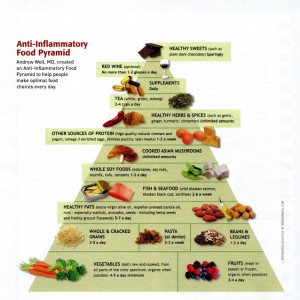Q: I’ve heard that chronic inflammation is linked with chronic illnesses including heart disease and cancer. How can I lower inflammation naturally to reduce my risk of illness?
A: There are many things that one can do to modify their diet and lifestyle and minimize systemic inflammation. First of all, the anti-inflammation diet is a good place to begin.

The ‘anti-inflammatory diet food pyramid’ by Dr. Andrew Weil is a helpful resource to follow. This is essentially a plant-based diet that lowers inflammation, emphasizing whole foods over processed and refined products. Whole grains including brown rice, quinoa, millets and oats replace processed grain products like bread, pasta and bagels. A high intake of vegetables is recommended, at least 5 servings daily of low-starch veggies and 2 servings of low-sugar fruits. Though this is a plant-based diet, including beans, nuts and seeds, it does not need to be vegetarian – though cutting back on meat and ensuring that only organic, grass-fed, free-ranging and lean meat are consumed is key to reducing inflammation. You may consider eliminating dairy or at least cutting back on dairy products, as dairy is a high source of pro-inflammatory fats. Most importantly, eliminating or greatly reducing flours, sugar, hydrogenated oils and fried foods, caffeine and alcohol are helpful for lowering inflammation.
Consult with a naturopathic doctor for a personalized nutritional plan including botanical and nutritional supplements based on your specific needs for lowering inflammation. Tests can be ordered that assess your inflammation level, such as C-Reactive Protein. In addition, functional micronutrient assessment helps to evaluate the degree of oxidative stress your body is under and how much support you may need from anti-inflammatory agents such as fish oil, herbs including ginger and turmeric, and antioxidant nutrients.

Leave a Reply